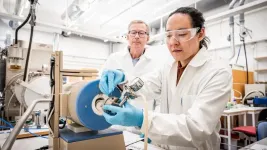(Press-News.org) PULLMAN, Wash. – Some of the world's deadliest bacteria seek out and feed on human blood, a newly-discovered phenomenon researchers are calling “bacterial vampirism.”
A team led by Washington State University researchers have found the bacteria are attracted to the liquid part of blood, or serum, which contains nutrients the bacteria can use as food. One of the chemicals the bacteria seemed particularly drawn to was serine, an amino acid found in human blood that is also a common ingredient in protein drinks.
The research finding, published in the journal eLife, provides new insights into how bloodstream infections occur and could potentially be treated.
“Bacteria infecting the bloodstream can be lethal,” said Arden Baylink, a professor at WSU’s College of Veterinary Medicine and corresponding author for the research. “We learned some of the bacteria that most commonly cause bloodstream infections actually sense a chemical in human blood and swim toward it.”
Baylink and the lead author on the study, WSU Ph.D. student Siena Glenn, found at least three types of bacteria, Salmonella enterica, Escherichia coli and Citrobacter koseri, are attracted to human serum. These bacteria are a leading cause of death for people who have inflammatory bowel diseases (IBD), about 1% of the population. These patients often have intestinal bleeding that can be entry points for the bacteria into the bloodstream.
Using a high-powered microscope system designed by Baylink called the Chemosensory Injection Rig Assay, the researchers simulated intestinal bleeding by injecting microscopic amounts of human serum and watching as the bacteria navigated toward the source. The response is rapid — it takes less than a minute for the disease-causing bacteria to find the serum.
As part of the study, the researchers determined Salmonella has a special protein receptor called Tsr that enables bacteria to sense and swim toward serum. Using a technique called protein crystallography, they were able to view the atoms of the protein interacting with serine. The scientists believe serine is one of the chemicals from blood that the bacteria sense and consume.
“By learning how these bacteria are able to detect sources of blood, in the future we could develop new drugs that block this ability. These medicines could improve the lives and health of people with IBD who are at high risk for bloodstream infections,” Glenn said.
Scientists Zealon Gentry-Lear, Michael Shavlik, and Michael Harms of the University of Oregon, and Tom Asaki, a mathematician at WSU, contributed to the research. The study was funded by WSU and the National Institute of Allergy and Infectious Diseases.
END
Deadly bacteria show thirst for human blood
2024-04-16
ELSE PRESS RELEASES FROM THIS DATE:
New insights could unlock immunotherapy for rare, deadly eye cancer
2024-04-16
New research from the University of Pittsburgh explains why metastatic uveal melanoma is resistant to conventional immunotherapies and how adoptive therapy, which involves growing a patient’s T cells outside the body before reinfusing them, can successfully treat this rare and aggressive cancer.
In a paper published today in Nature Communications, the Pitt researchers also explain how they developed a new clinical tool that predicts which patients will respond to adoptive therapy. The work, supported by UPMC Enterprises, is helping improve personalized therapies and avoid futile treatments for metastatic uveal melanoma.
“The dogma was that uveal melanoma is ...
Biodiversity is key to the mental health benefits of nature, new study finds
2024-04-16
New research from King’s College London has found that spaces with a diverse range of natural features are associated with stronger improvements in our mental wellbeing compared to spaces with less natural diversity.
Published in Scientific Reports and funded by the National Institute for Health and Care Research (NIHR) and Wellcome, this citizen science study used the smartphone application Urban Mind to collect real-time reports on mental wellbeing and natural diversity from nearly 2000 participants.
Researchers found that environments with ...
A single atom layer of gold – LiU researchers create goldene
2024-04-16
For the first time, scientists have managed to create sheets of gold only a single atom layer thick. The material has been termed goldene. According to researchers from Linköping University, Sweden, this has given the gold new properties that can make it suitable for use in applications such as carbon dioxide conversion, hydrogen production, and production of value-added chemicals. Their findings are published in the journal Nature Synthesis.
Scientists have long tried to make single-atom-thick sheets of gold but failed because the metal’s tendency to lump together. But ...
Most countries struggle to meet climate pledges from 2009
2024-04-16
Nineteen out of 34 countries surveyed failed to fully meet their 2020 climate commitments set 15 years ago in Copenhagen, according to a new study led by UCL researchers.
The study, published in Nature Climate Change, compared the actual net carbon emissions of more than 30 nations to their 2009 pledged emission reduction targets set during the Copenhagen Climate Summit.
The paper led by researchers at UCL and Tsinghua University is the first effort to comprehensively gauge how well countries were able to meet their Nationally Determined Contribution reduction pledges from COP15.
Of the 34 nations analysed in the study, ...
Photonic computation with sound waves
2024-04-16
Optical neural networks may provide the high-speed and large-capacity solution necessary to tackle challenging computing tasks. However, tapping their full potential will require further advances. One challenge is the reconfigurability of optical neural networks. A research team in the Stiller Research Group at the Max Planck Institute for the Science of Light, in collaboration with the Englund Research Group at the Massachusetts Institute of Technology, has now succeeded in laying the foundation for new reconfigurable neuromorphic building blocks by adding a new dimension to photonic machine learning: sound waves. The researchers use light to create ...
New study focuses on the placenta for clues to the development of gestational diabetes
2024-04-16
BOSTON, MA – A new study led by the Harvard Pilgrim Health Care Institute has identified that a deficit in the placental expression of the gene insulin-like growth factor 1 (IGFBP1) and low IGFBP1 circulating levels are associated with insulin resistance during pregnancy, highlighting a potential risk factor for the development of gestational diabetes.
The study, “Placental IGFBP1 levels during early pregnancy and the risk of insulin resistance and gestational diabetes,” appears in the April 16, 2024 edition of Nature Medicine.
Gestational diabetes, a disease that can lead to multiple pregnancy and delivery complications, is the most common pregnancy ...
Care home staff and residents need ‘family’ bonds to thrive
2024-04-16
University of Leeds news
Embargo: Tuesday 16 April, 2024, 10am UK time
Care home staff and residents need ‘family’ bonds to thrive
Care home residents receive much better care when they enjoy ‘family’ bonds with staff – but staff must be empowered to create these bonds, new research has found.
The study, led by the University of Leeds and funded by The National Institute for Health and Care Research, found that when care home staffing is stable and consistent and numbers are sufficient, workers have the capacity to develop ‘familial’ ...
New Inflammatory Bowel Disease testing protocol could speed up diagnosis
2024-04-16
Patients with suspected inflammatory bowel disease (IBD) could benefit from better testing protocols that would reduce the need and lengthy wait for potentially unnecessary colonoscopies, a new study has found.
In a paper published in Frontline Gastroenterology, researchers from the Birmingham NIHR Biomedical Research Centre (BRC) at the University of Birmingham tested a new protocol to improve IBD diagnosis combining clinical history with multiple home stool tests.
In the two-year study involving 767 participants, patients were triaged and had repeated faecal calprotectin (FCP) tests and the research team found that the use of serial FCP tests were able to strongly predict possible ...
Most massive stellar black hole in our galaxy found
2024-04-16
Astronomers have identified the most massive stellar black hole yet discovered in the Milky Way galaxy. This black hole was spotted in data from the European Space Agency’s Gaia mission because it imposes an odd ‘wobbling’ motion on the companion star orbiting it. Data from the European Southern Observatory’s Very Large Telescope (ESO’s VLT) and other ground-based observatories were used to verify the mass of the black hole, putting it at an impressive 33 times that of the Sun.
Stellar black holes are formed from the collapse of massive stars and the ones ...
New review offers first recommendations on accurately assessing the carbon footprint of coffee farming
2024-04-16
Tuesday 16 April: A new scientific review1 published in Sustainable Production and Consumption explores how best to standardize measurement of the environmental impact of coffee – a commodity increasingly threatened by climate change2.
Measurement of green coffee’s carbon footprint has traditionally varied, as is often the case for any agricultural lifecycle assessment. The Institute for Scientific Information on Coffee (ISIC) commissioned the French Agricultural Research Centre for International Development (CIRAD) to review current methodologies for green coffee, revealing a more precise picture of how to measure the environmental impact of the ...






